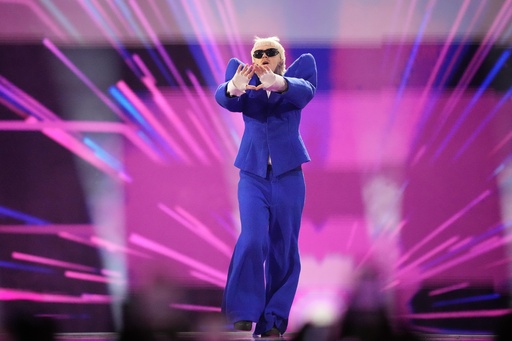MALMO, Sweden (AP) — Eden Golan is in Sweden for the Eurovision Song Contest, but she isn’t seeing much of the country.
The 20-year-old Israeli singer is surrounded by security as she travels between hotel and the contest venue in the city of Malmo. According to Israel’s public broadcaster, she practiced singing while being booed to prepare for her performance in the pan-continental song competition.
Golan has become a focus for protests by pro-Palestinian demonstrators who want Israel kicked out of Eurovision over the war with Hamas, which has killed almost 35,000 people in Gaza. The war began with Hamas’ surprise attack into southern Israel in October, in which the militant group killed around 1,200 people, mostly civilians, and took 250 others hostage.
A crowd estimated by police at more than 10,000 marched through the southern Swedish city on Thursday to chants of “Free Palestine” and “Israel is a terror state.” Banners accused Eurovision of being complicit in genocide and called for a boycott of the competition.
Another protest march is planned for Saturday, hours before Golan competes in the live Eurovision final against acts from 25 other countries.
One of those 25, the Netherlands’ Joost Klein, failed to perform at a dress rehearsal on Friday where he was slotted to appear just before Israel. Organizer, the European Broadcasting Union, gave no explanation but said it was “currently investigating an incident that was reported to us involving the Dutch artist. He will not be rehearsing until further notice.” It was unclear whether his absence was related to Israel’s participation.
Israel is allowed to compete in Eurovision, even though it’s not in Europe, because its national broadcaster belongs to the European Broadcasting Union, whose membership extends beyond the continent.
Golan has largely stayed out of sight in Malmo, apart from rehearsals and performances at the Malmo Arena. While other performers have taken the stage for fans in a Eurovision park in the city, Golan has not.
She was one of 10 acts who made it through Thursday’s semifinal, which was decided by votes from Eurovision viewers around the world. Golan has been greeted with a smattering of boos, as well as applause, from spectators in the arena. Bookmakers say she is likely to finish in the top half of the final competition, decided by a mix of public votes and national music-industry juries.
Israeli Prime Minister Benjamin Netanyahu praised Golan for performing despite “contending with an ugly wave of antisemitism.”
“So be blessed, and know that when they boo you, we are cheering you on,” he said.
Golan’s song is a powerful ballad titled “Hurricane” — but that wasn’t its original name. The song was first called “October Rain,” an apparent reference to the Oct. 7 Hamas attack. That fell foul of contest rules banning “political” content.
The retitled song contains less specific lyrics about going through a tough time, and asserts that “love will never die.”
Born in Israel to parents from the former Soviet Union, Golan spent much of her childhood in Russia and performed on televised talent shows there before moving back to Israel. She cites Beyoncé, Ariana Grande, Whitney Houston and Justin Timberlake among her inspirations.
She has avoided direct political statements, but said it was “such an honor to represent my country, especially in these times.”
Speaking after the semifinal, Golan said she was “overwhelmed with emotions.”
“I’m just super excited to go on stage once more and share a bit of my love with everyone,” she said.
___
Yesica Fisch contributed to this story from Jerusalem.



